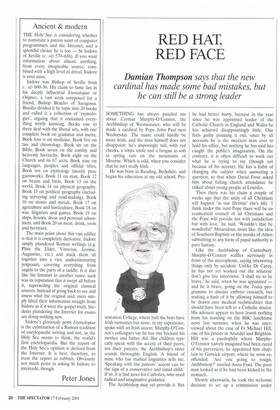Ancient & modern
THE Holy See is considering whether to nominate a patron saint of computer programmers and the Internet, and a splendid choice he is too — St Isidore of Seville (c. AD 570-636). If you want information about almost anything, from every imaginable source, combined with a high level of drivel, Isidore is your saint.
Isidore was Bishop of Seville from c. AD 600-36. His claim to fame lies in his deeply influential Etymologiae or Origines, a vast work composed for a friend, Bishop Braulio of Saragossa. Braulio divided it by topic into 20 books and called it a collection of 'etymologies', arguing that it contained everything worth knowing. Books one to three deal with the liberal arts, with one complete book on grammar and metre. Book four is on medicine, Book five on law and chronology, Book six on the Bible, Book seven on the earthly and heavenly hierarchy, Book eight on the Church and its 67 sects, Book nine on languages, peoples and official titles, Book ten on etymology (mostly pure guesswork), Book 11 on man, Book 12 on beasts and birds, Book 13 on the world, Book 14 on physical geography, Book 15 on political geography (including surveying and road-making), Book 16 on stones and metals, Book 17 on agriculture and horticulture, Book 18 on war, litigation and games, Book 19 on ships, houses, dress and personal adornment, and Book 20 on meat, drink, tools and furniture.
The main point about this vast edifice is that it is completely derivative. Isidore simply plundered Roman writings (e.g. Pliny the Elder, Vitruvius, Jerome, Augustine, etc.) and stuck them all together into a vast, undiscriminating potpourri, covering everything from angels to the parts of a saddle. It is also like the Internet in another sense: such was its reputation that it swept all before it, superseding the original classical sources. Instead of going back to see and assess what the original said, users simply lifted their information straight from Isidore as if it were the gospel truth. Students plundering the Internet for essays are doing nothing new.
Isidore's gloriously potty Elymologiae is the culmination of a Roman tradition of encylopaedic writing and not, as the Holy See seems to think, the world's first encyclopaedia. But the report of the Holy See's opinion is derived from the Internet. It is best, therefore, to treat the report as rubbish. Obviously not much point in asking St Isidore to intercede, though.
Peter Jones


































































 Previous page
Previous page